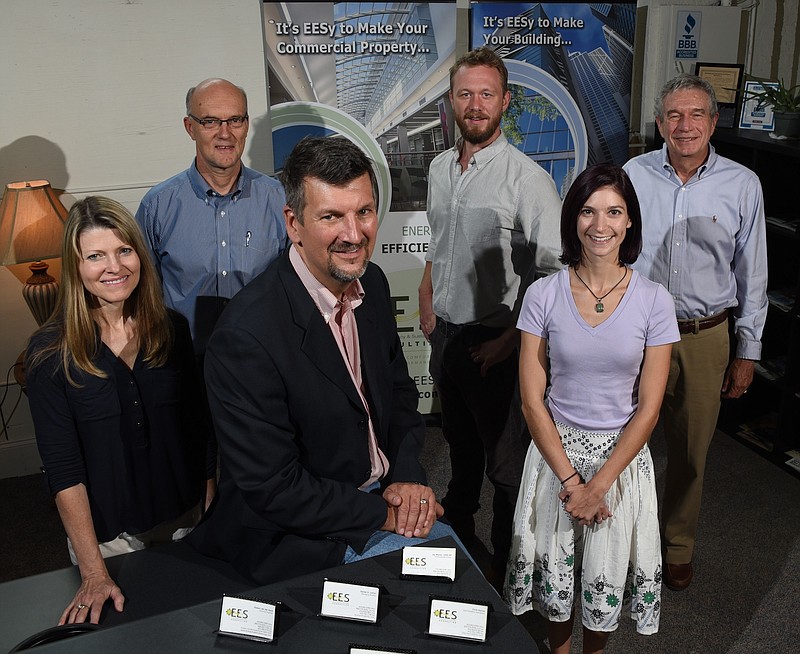When the White House this summer proposed America's first carbon controls to limit climate change, President Obama said the United States has "a moral obligation" to lead in curbing emissions of greenhouse gases to make the globe less polluted for future generations.
Dan LeVan has built an energy consulting business in Chattanooga over the past three years that helps businesses reduce their carbon footprint and achieve Obama's clarion call. But LeVan, a former banker, controller and finance officer for a number of international companies, sees his company's efforts in more practical than moral terms.
"The projects we work on help businesses save money on their energy bills and often make their operations less vulnerable to power disruptions," says LeVan, the managing director for Energy Efficiency and Sustainability (EES) Consulting in Chattanooga. "Our recommendations are typically a 25 percent plus return on investment with a payback of less than four years."
Before he started EES in December 2012, LeVan worked in units of financial giants AIG, GE Capital and TD International around the globe. LeVan brings a business approach to the company's environmental work.
"This was an investment for me, and we focus our efforts on those projects that make the most financial sense and have the strongest payoff," says LeVan, who bought out his two original partners of EES in 2014.
Last year, the typical customer served by EES reduced electrical consumption by 30 percent, ranging from 10 percent on the low end up to 55 percent savings for one client. EES, which typically works with nearly two dozen clients a year, is now working with major businesses from Toronto to California.
Energy projects are more difficult to justify in Chattanooga than other markets where power rates are higher and renewable energy alternatives do better because of more abundant wind or sun compared with Chattanooga. "The margins are usually better elsewhere," LeVan explains.
But LeVan, who says he has fallen in love with his transplanted home in Chattanooga, says most of his clients are in the Chattanooga region. And he insists there are still plenty of profits for getting more efficient by installing new and better lighting, windows, insulation or installing controls to help shift power loads to different times and seasons when rates may be more favorable or surplus power more readily available. In some circumstances, putting up solar panels or other renewable energy generation makes sense, especially with current investment credits and accelerated depreciation allowances for such services.
Hubert van der Harst, an electrical engineer who has helped develop many of the energy-saving plans for businesses, said today's LED lights use less than half the power of the bulbs they replace and usually last at least twice as long. Window shades, thermostat controls and more energy efficient heaters and appliances can dramatically cut energy consumption at many businesses, he said.
"We look for the best opportunities that make the most financial sense and we've been able to do that across a number of industries," he says.
Chris Wolfe at Cardin Management in Chattanooga said EES reviewed energy use at Cardin's Medical Park One, Three and Jarnigan. "The energy savings were even better than the projections from the assessment," Wolfe says.
Southern Power Sports used EES to change the dealer showroom lights at a couple of locations. Bowers Automotive Group also employed EES to make energy upgrades at five dealership facilities.
"The results were outstanding," says David Plummer, Bowers' chief financial officer.
EES uses its half-dozen energy experts to tour, assess and develop energy savings plans for businesses. Unlike many such firms, EES helps its clients understand the finances, tax and incentive programs and even can offer financing options for businesses, although LeVan says the payoff is usually so strong and quick that financing is not required.
"We streamline and simplify the process for every building so that instead of spending time interviewing independent product vendors, you receive a total solution recommendation," LeVan says.
Steve Hunt, a partner with Berry and Hunt, said lighting improvements in the CitiPark garage, combined with tax advantages for such claims, achieved a 90 percent return on investment and a payback in just over a year's time.
"Electricity usage is expected to be reduced by over 60 percent and the market value of the property has increased by $180,000," Hunt says. "The carbon footprint reduction is equivalent to 215,000 pounds per year (which helped the building achieve LEED Gold certification by the U.S. Green Council)."
